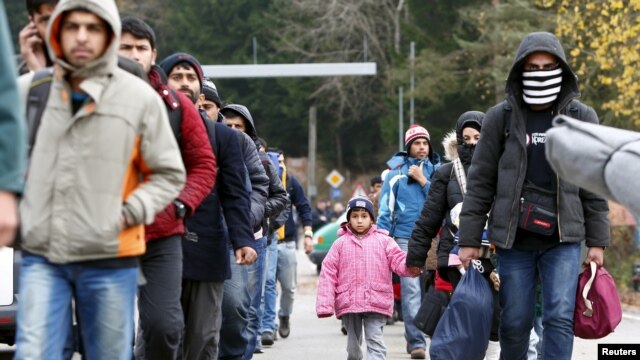Fear, Frustration Among Refugees in Germany as Terror Tensions Rise
|
|
Date: 11/22/2015 6:19:16 PM
Sender: VOA
|

FILE - Migrants walk along a street after passing the Austrian-German border near Wegscheid, Germany, Nov. 12, 2015.
MANNHEIM, GERMANY—
As fears intensify over terrorists threats in Europe, a cloud of worry hangs over the refugee camps on the continent. In Germany, Syrians say they fear backlash if they are blamed for Islamic State militants’ increasingly horrifying campaign.
“People are talking about us,” said 27-year-old Fahed, a mechanic who fled Damascus only weeks ago, at a coffee shop on Friday night. “We hear, ‘Syrian, Syrian.’ But we don’t know what else they are saying about us.”
In the wake of the Paris attacks, he said, Syrian refugees in Europe are sometimes feared and politicians around the world are warning that terrorists may be hiding among the refugees.
Fahed’s friend, 17-year-old Hashem, who came to Germany alone to escape forced military service, explained how unjust it sounds to refugees. Avoiding fighting with any army, including extremist militant groups and violent gangs is one of the main reasons so many young men are fleeing Syria.
“We ran away from bombs and war,” he said, shivering slightly in a purple wool hat on a night much colder than Syrians are accustomed to. “What we want the most is to impress people here with how good Syrians are.”
Security fears surrounding refugees are also frustrating, he said, because staying in Syria wasn’t an option for him.
If a person is forced or coerced into joining one group fighting, and a cousin or a friend joins another, he may have no choice but turn his weapon on someone he loves, or die.
“I don’t want to kill my friends,” he argued, defending his choice to flee Syria.“No, I won’t kill anyone.”
Languishing in a “Safe Place”
For the young men in the coffee shop, Germany remains a safe place, if not particularly pleasant.German people are generally welcoming and still seem committed to making the refugee system function, despite the growing numbers.
By some estimates, 1.5 million from the Middle East, Africa and increasingly other places will have migrated to Europe by the beginning of 2016.
Once in Europe, the process of seeking legal asylum is painfully slow, said Hashem. Some travelers languish for months waiting for interviews that will establish them as refugees with legal rights in Germany.
Once all the migrants are all processed through, it is not clear what European countries will do with the masses of people also fleeing Africa and the Middle East because of extreme poverty, which can often be as life threatening as war.
But the next morning at a market popular among refugees because it sells used goods, or discounted items one else wants, some people said their new lives in Europe are much harder than they expected.
“I’m shopping here because I spent all the money I had getting to Europe,” said Manal, a mother of three with another on the way.A few weeks ago, she fled Yarmouk, a Palestinian refugee camp in Syria.“But the situation was so hard.I couldn’t handle it anymore.”
American Politicians
Usually, the only American politicians who are famous among refugees and other migrants are those who deal with foreign policy in the Middle East and Africa.
But comments from some U.S. 2016 presidential candidates and some state governors over the past week were alarming enough to grab the attention of many people living in the camps in Germany. For four young refugees on a public train, suggestions like monitoring mosques in the U.S., and banning refugees from certain American states seemed like a bizarre solution to a problem that doesn’t exist.
Out of more than 4 million and counting Syrian refugees, so far only about 2,200 have been admitted to the United States.
President Barack Obama has promised to open the door to 10,000 Syrian refugees and said he will veto legislation that puts more restrictions on Syrian and Iraqi refugees
On the train and in the market, one comment in particular from presidential hopeful Ben Carson had everyone talking.
In the comment, Carson compared terrorists to “rabid dogs” but then concluded “But that doesn’t mean you hate all dogs.”Calling a person a “dog” in Arabic is extremely insulting.
“The man called us all crazy dogs,” said Qutaiba, a 16-year-old from Aleppo, a city in tatters after five years of constant battles.“What should we think?” |
|
| |
